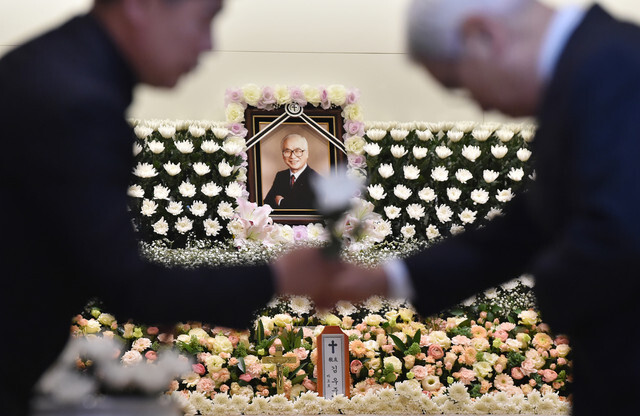hankyoreh
Links to other country sites 다른 나라 사이트 링크
[Editorial] S. Korea’s conglomerates can learn from Kim Woo-choong’s adventurousness

Kim Woo-choong, a pioneer of “global management” and former chairman of the now-defunct Daewoo Group, passed away on Dec. 9, at the age of 83. Few Korean businessmen have lived such an eventful life, or could claim such a mixture of distinction and disgrace.
Unlike the other founders of South Korea’s chaebols — such as Lee Byung-chul of Samsung and Chung Ju-yung of Hyundai — Kim Woo-choong started his career as a lowly office worker. Kim launched the group under the name Daewoo Industrial in 1967, at the age of 31, with just 5 million won (US$4,185) of capital. Within the next 30 years, he built the country’s second-largest conglomerate, a sprawling empire encompassing automobiles, heavy industry, shipbuilding, electronics, finance, and hotels, elevating Kim into the “hero of the salaryman” because of his humble beginnings.
As Kim described in his book “It’s a Big World, and There’s a Lot to Do,” he spent the 1990s traveling from one country to another as he created his brand of global management. At one time, 350,000 of employees, both in Korea and other countries, were part of a network of some 600 overseas subsidiaries and branch offices that accounted for 14% of Korea’s exports.
But Kim’s global management was shattered by the 1997 Asian financial crisis. After assuming the chairmanship of the Federation of Korean Industries in March 1998, he sought to help Korea weather the economic crisis by claiming a US$50 billion current account surplus, but in the end, he wasn’t able to save the Daewoo Group. Given its reliance on massive debt, the group was strangled by soaring interest rates and exchange rates, both of which more than doubled.
When the Kim Dae-jung administration turned the screws of corporate restructuring, the group fell apart in 1999. After spending a few years hiding abroad, Kim was convicted in 2006 of fraudulent accounting to the tune of 20 trillion won (US$16.74 billion), setting a new record. He was given a prison sentence of 8 years and 6 months and fined 17.9 trillion won (US$14.98 billion), only to be pardoned in 2008. Kim devoted his remaining energy over the past decade to visiting his “second home” of Vietnam and training young people in starting businesses overseas.
Kim leaves two major legacies for the Korean economy. The collapse of his “global management” and “expanded management,” propped up on unwise loans, spelled the end of the “too big to fail” myth that had shielded the chaebol during the four decades after Korea’s industrialization in the 1960s. Afterward, the management paradigm of Korean companies rapidly shifted its focus from outer appearance to inner substance.
Through the “legend of global management,” which was built on the passion of a former office worker who spent more than two-thirds of the year doing business overseas, Kim became a symbol of the entrepreneurial drive to create something out of nothing. Those in the business world will remember Kim as a forerunner of global management and a major player in the country’s economic development. By being the first to explore uncharted territory, Kim serves as a lasting example of the entrepreneurial spirit.
Many are concerned that Korea’s conglomerates are sitting on huge cash reserves, while being stingy in hiring and investing. We hope that the grandchildren and great-grandchildren of the groups’ founders will take a page from Kim’s entrepreneurial playbook.
Please direct comments or questions to [english@hani.co.kr]

Editorial・opinion
![[Editorial] Penalties for airing allegations against Korea’s first lady endanger free press [Editorial] Penalties for airing allegations against Korea’s first lady endanger free press](https://flexible.img.hani.co.kr/flexible/normal/500/300/imgdb/original/2024/0502/1817146398095106.jpg) [Editorial] Penalties for airing allegations against Korea’s first lady endanger free press
[Editorial] Penalties for airing allegations against Korea’s first lady endanger free press![[Editorial] Yoon must halt procurement of SM-3 interceptor missiles [Editorial] Yoon must halt procurement of SM-3 interceptor missiles](https://flexible.img.hani.co.kr/flexible/normal/500/300/imgdb/child/2024/0501/17145495551605_1717145495195344.jpg) [Editorial] Yoon must halt procurement of SM-3 interceptor missiles
[Editorial] Yoon must halt procurement of SM-3 interceptor missiles- [Guest essay] Maybe Korea’s rapid population decline is an opportunity, not a crisis
- [Column] Can Yoon steer diplomacy with Russia, China back on track?
- [Column] Season 2 of special prosecutor probe may be coming to Korea soon
- [Column] Park Geun-hye déjà vu in Yoon Suk-yeol
- [Editorial] New weight of N. Korea’s nuclear threats makes dialogue all the more urgent
- [Guest essay] The real reason Korea’s new right wants to dub Rhee a founding father
- [Column] ‘Choson’: Is it time we start referring to N. Korea in its own terms?
- [Editorial] Japan’s rewriting of history with Korea has gone too far
Most viewed articles
- 160% of young Koreans see no need to have kids after marriage
- 2Presidential office warns of veto in response to opposition passing special counsel probe act
- 3[Editorial] Penalties for airing allegations against Korea’s first lady endanger free press
- 4Months and months of overdue wages are pushing migrant workers in Korea into debt
- 5Japan says it’s not pressuring Naver to sell Line, but Korean insiders say otherwise
- 630th anniversary Wednesday Demonstration pushed out of memorial site by far-right
- 7Inside the law for a special counsel probe over a Korean Marine’s death
- 8Dermatology, plastic surgery drove record medical tourism to Korea in 2023
- 9[Guest essay] Maybe Korea’s rapid population decline is an opportunity, not a crisis
- 10Trump asks why US would defend Korea, hints at hiking Seoul’s defense cost burden